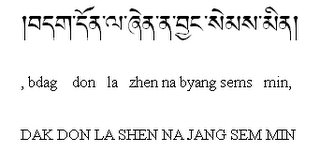ZHEN PA BZHI BRAL - Third Line
 This is the third line in bzhen pa bzhi brel. We know the basic structure of the sentences from the earlier lines, and the words should be familiar by now.
This is the third line in bzhen pa bzhi brel. We know the basic structure of the sentences from the earlier lines, and the words should be familiar by now.OK, here's one translation: You don't have the mind of enlightenment if you have an attachment to your own needs.
There are many other translations, so check each one out. For example, here's the one from a commentary by HH Sakya Trizin. Another one is the translation in the Asian Classics Institute Course 14 (this is a PDF file and you need to scroll halfway to find the translated version) What differs is how sems byung is translated, enlightened mind (bodhichitta), or bodhisattva? Ultimately this is not a big problem, as a bodhisattva is someone who indeed has bodhichitta.
Anyway, one teaching from this line is that as long as we think of our own needs, we are not developing the mind of enlightenment, but if we start thinking about the welfare of others, how small the taught is, then we are doing it.
